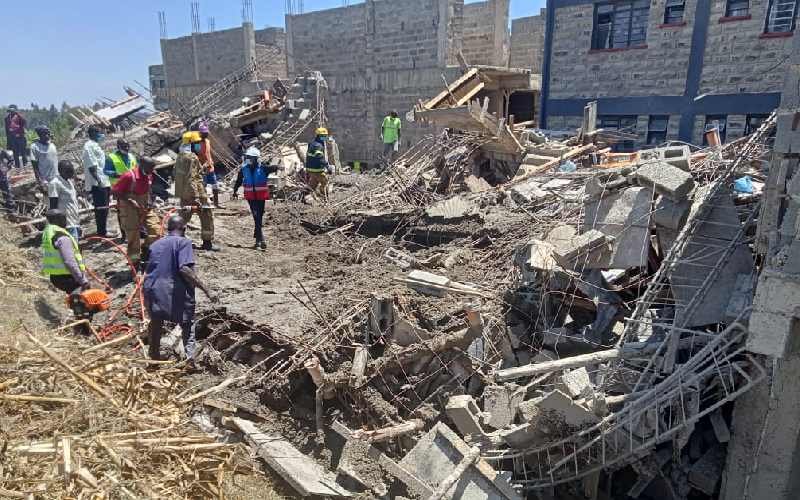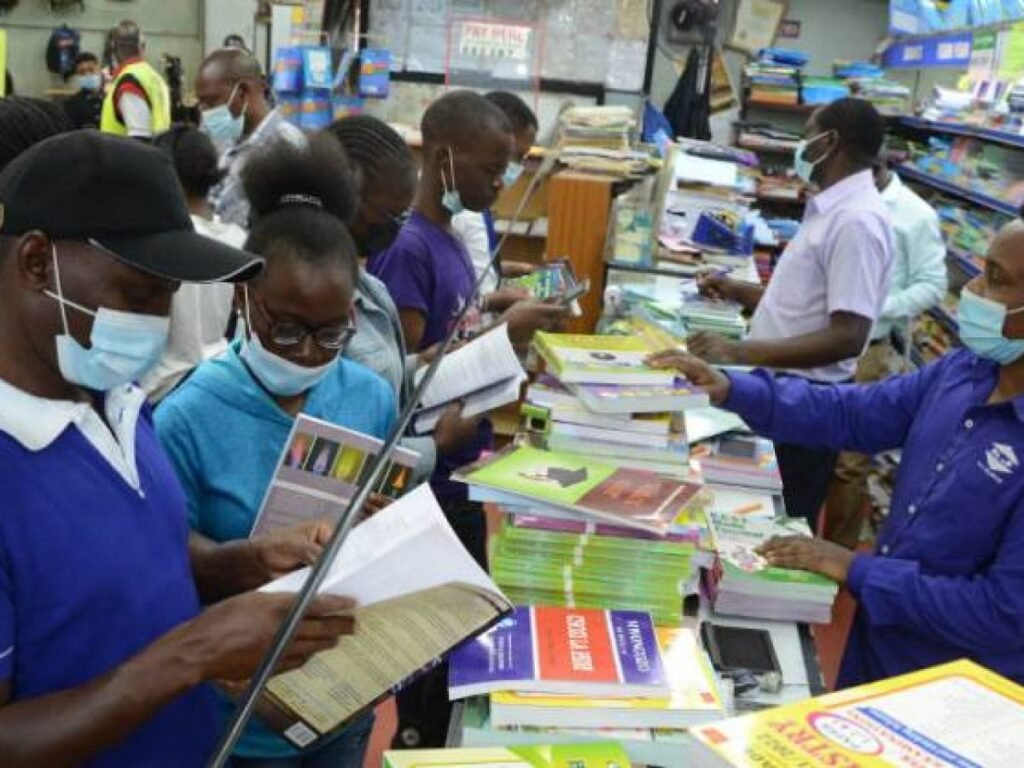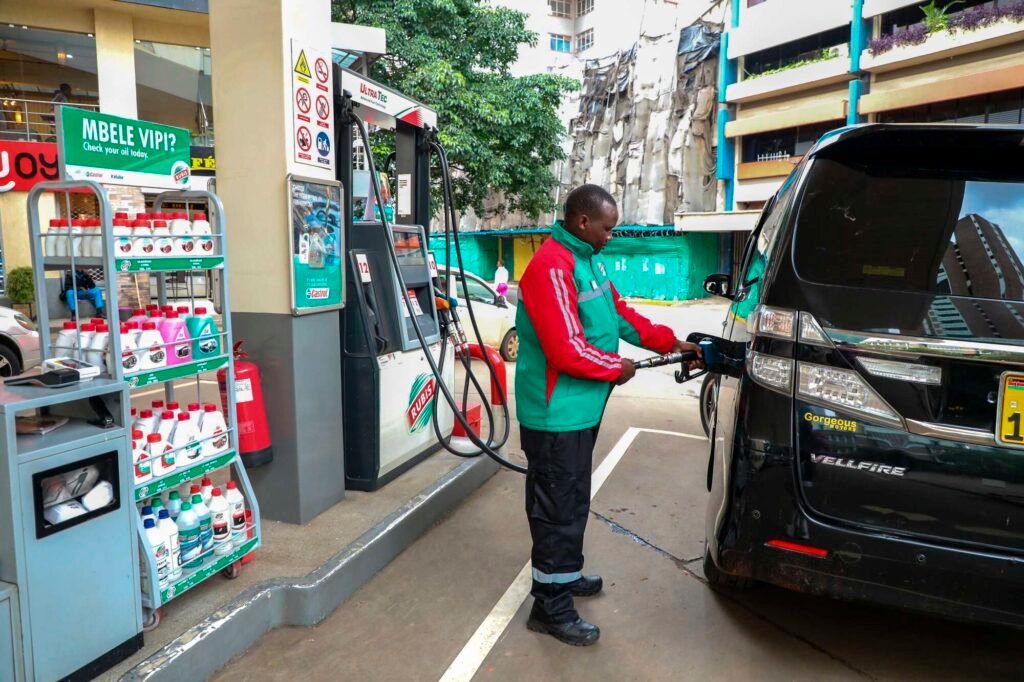General News
Third Body Retrieved From Building That Collapsed In Mamboleo, Kisumu

A two-storey building under construction has collapsed in Mamboleo, Kisumu county. As at 5:47pm, three bodies have been retrieved from the collapsed building.
At least seven people have been rescued and taken to hospital. Several others were still trapped under the rubble.
Search and rescue operations are ongoing.
The National Construction Authority (NCA) has told The Standard that the collapsed building was inspected twice and activities at the site stopped in May 2021 over safety concerns. NCA however claims that the owner continued with construction behind their back and did not have approval.
Joseph Okeyo, a survivor, has told The Standard that the incident happened in a flash. “We did not anticipate what happened. We just heard a cracking sound and then the building collapsed,” he said.
Okeyo went on, “We were having lunch on site and I had just left her (food vendor) serving my colleagues before the incident happened.”
By 2pm an excavator was yet to arrive at the scene as firefighters and other rescue workers struggled to cut through the rubble.
Moments after the building collapsed, residents pulled a mother and a child who were crying from the building.
A few meters from where the building collapsed, several construction workers who escaped death by a whisker were still in shock. They were working on one side of the building that was left with large cracks following the collapse.
The incident comes as surveyors have raised an alarm over substandard houses being constructed in Nairobi.
A five-storey residential building in Kinoo, Kiambu County, was on September 6 brought down following orders from the county government and the NCA. The building was safely demolished under the supervision of engineers from NCA and officers from the county government.
NCA engineers inspected the site on September 3 and issued a stop order to the developer due to non-compliance. The authority, in a statement, said the building developed cracks and started crumbling due to foundation subsidence.
According to the Institute of Quantity Surveyors of Kenya (IQSK), the developers sought the services of unlicensed persons to cut construction costs.
IQSK urged developers to avoid shortcuts when building houses to avert losses from collapsed or demolished buildings.
“The leaning five-story structure in Kinoo might have been averted if thorough compliance had been observed,” said IQSK president James Munene. He urged professionals to carry out their duties diligently.
Munene said all practitioners and respective authorities know why our buildings are collapsing.
“Equally, we all know what is at stake are human lives and loss of wealth. We need to get our act together,” he said.
According to IQSK Vice President Jenifer Musyimi, the earliest documented case of building collapse in Kenya was in 1990, where a multi-storeyed building in Dagoretti collapsed, killing one and injuring others.
She said since then, over 200 people have lost their lives and thousands injured in similar circumstances.
General News
IMF Criticizes Kenya’s Fuel Subsidy Re-Introduction, Warns of Budget Distortion

The International Monetary Fund (IMF) has criticized Kenya for re-implementing the fuel subsidy scheme, expressing concerns that the lack of funds to pay oil marketers could distort the budget.
Despite a previous commitment by President William Ruto in 2022 not to subsidize pump prices, the government reintroduced the subsidy, preventing petrol and diesel prices from reaching higher levels in October 2023.
The IMF argues that the subsidy was applied without available funds, as the Treasury has yet to pay oil marketers at least Ksh9 billion ($55.6 million) accumulated from the previous year. President Ruto’s decision to reinstate subsidies goes against conditions set by the IMF for accessing loans.
Petrol and diesel prices, which were Ksh217.36 ($1.34) and Ksh205.47 ($1.27) respectively in Nairobi in October 2023, remained lower than the potential Ksh220.43 ($1.36) and Ksh217.11 ($1.34) due to the subsidy. However, the IMF disapproves of the decision, emphasizing that the removal of the subsidy was a key condition for a 38-month budget support scheme.
The IMF criticizes the prolonged process of forming a taskforce and delays in implementing decisions regarding fuel pricing.
The removal of the subsidy in May of the previous year led to record-high pump prices, crossing the Ksh200-mark later in the year due to a combination of subsidy removal and a VAT increase to 16 percent.
Kenya’s administration, faced with rising fuel costs, chose to reinstate the subsidy, prompting the IMF to raise alarms over the lack of budgeted funds and potential distortions in the country’s financial plans.
The ongoing disagreement highlights the challenges and consequences associated with balancing domestic economic policies and meeting international financial commitments
General News
Parents in Meru County Turn to Second-Hand Books Amid Economic Hardships

As the back-to-school rush season unfolds in Meru County, a growing number of parents are making a strategic choice to purchase second-hand books for their children.
This decision stems from the challenging economic conditions that have prompted families to seek ways to cut costs.
Among these parents is Ms. Prisca Gakii, who revealed that opting for second-hand books allows her to save money, which can then be allocated towards essential expenses like school fees.
She highlighted a practical advantage for Form-One students, emphasizing that using older books can protect them from potential theft, as new books often become targets for less scrupulous classmates.

Ms. Gakii pointed out a notable price difference, citing an example of a new Oxford dictionary priced at almost Sh1,900, compared to a used one available for Sh1400.
She justified her preference for the older but more affordable option, emphasizing that they contain the same content.
Janet Wamuyu, a second-hand books trader, shed light on the lucrative nature of their business during the opening of the first term, which coincides with the peak season.
As learners transition to new grades or classes, there is a heightened demand for various books, including dictionaries, Kamusi, and Golden Bells.

Wamuyu explained that this period, especially when Form-One students are joining school, facilitates easy acquisition of books for new stock.
The trading process involves exchanging books for the next grade or class at a lower rate, providing an economical alternative for parents instead of purchasing an entirely new set of books.
She further noted that their source of new stock comes from parents whose children have completed their studies and no longer require the books.
Despite the success during the peak season, Wamuyu acknowledged the challenges faced during other times of the year when only a few revision books are in demand, highlighting the cyclical nature of the business in Meru County.















